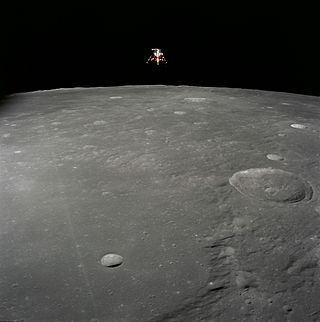Related Research Articles
The Centennial Challenges are NASA space competition inducement prize contests for non-government-funded technological achievements by American teams.

The physical exploration of the Moon began when Luna 2, a space probe launched by the Soviet Union, made an impact on the surface of the Moon on September 14, 1959. Prior to that the only available means of exploration had been observation from Earth. The invention of the optical telescope brought about the first leap in the quality of lunar observations. Galileo Galilei is generally credited as the first person to use a telescope for astronomical purposes; having made his own telescope in 1609, the mountains and craters on the lunar surface were among his first observations using it.

Galactic Suite Design is an aerospace design company based in Barcelona, Spain. The company develops concepts and designs for aerospace projects. The company became well known for its announcement of the Galactic Suite Space Resort, a cancelled plan to create an orbital space station.

The Google Lunar XPRIZE (GLXP), sometimes referred to as Moon 2.0, was a 2007–2018 inducement prize space competition organized by the X Prize Foundation, and sponsored by Google. The challenge called for privately funded teams to be the first to land a lunar rover on the Moon, travel 500 meters, and transmit back to Earth high-definition video and images.
Powerset was an American company based in San Francisco, California, that, in 2006, was developing a natural language search engine for the Internet. On July 1, 2008, Powerset was acquired by Microsoft for an estimated $100 million.

Astrobotic Technology is an American privately held company that is developing space robotics technology for lunar and planetary missions. It was founded in 2007 by Carnegie Mellon professor Red Whittaker and his associates with the goal of winning the Google Lunar X Prize. The company is based in Pittsburgh, Pennsylvania. The first launch of one of its spacecraft, the Peregrine lunar lander, is expected to take place in the first quarter of 2023.

Team FREDNET is an international Open Source and Open Participation competitor in the Google Lunar X PRIZE competition. Uniquely, the team also allows organizations and individuals to participate freely in its mission through the team's website. Their strategy is to utilize the same approach for developing open source software in order to build a lunar lander and a lunar rovers capable of winning the Google Lunar X Prize. Team FREDNET plans to establish an Open Space Foundation that provides incentives, education, and funding to future individuals and organizations seeking to develop their own space projects. In addition, they hope to foster greater public interest and education in Space Exploration and Research.

Hakuto (ハクト) or formerly White Label Space (ホワイトレーベルスペース) was a team formed in early 2008 by a group of experienced space professionals inspired by the challenge of the Google Lunar X PRIZE to develop a robotic Moon exploration mission.
Planetary Transportation Systems (PTS), formerly known as PTScientists and Part-Time Scientists, is a Berlin-based aerospace company. They developed the robotic lunar lander "ALINA" and seek to land on the Moon with it. They became the first German team to officially enter the Google Lunar X-Prize competition on June 24, 2009, but failed to reach the finals in 2017 for lack of a launch contract. During the summer of 2019, the company filed for bankruptcy, and the ALINA project was put on hold. In July 2021, PTS was selected with ArianeGroup to build ESA's ASTRIS kick-stage.

A lunar rover or Moon rover is a space exploration vehicle designed to move across the surface of the Moon. The Apollo Program's Lunar Roving Vehicle was driven on the Moon by members of three American crews, Apollo 15, 16, and 17. Other rovers have been partially or fully autonomous robots, such as the Soviet Union's Lunokhods and the Chinese Yutus. Three countries have had operating rovers on the Moon: the Soviet Union, the United States and China. An Indian mission failed while Japan and Greece currently have planned missions.

Puli Space Technologies is a Hungarian company established by individuals in June 2010 in order to take part in Google Lunar X Prize Challenge and other competitions, and further to facilitate development of space industry in Hungary, to promote scientific thinking and encourage students to choose scientific careers.
Moon Express is an American privately held early-stage company formed in 2010 by a group of Silicon Valley and space entrepreneurs. It had the goal of winning the $30 million Google Lunar X Prize, and of ultimately mining the Moon for natural resources of economic value. The company was not able to make a launch attempt to reach the Moon by March 31, 2018, the deadline for the prize.
The Rocket City Space Pioneers (RCSP) was one of 29 teams from 17 different countries officially registered and in the competition for the Google Lunar X PRIZE (GLXP) during 2010–2012.
SpaceMETA is a Brazilian Group founded in 2010 to explore aerospace opportunities motivated by Google Lunar XPrize Competition
TeamIndus is a private for-profit aerospace company headquartered in Bangalore, India. It consists of a team of professionals from various backgrounds in science, technology, finance, and media, that came together in 2010 with the aim of winning the Google Lunar X Prize competition announced in 2007. Although the competition ended in 2018 without a winner, TeamIndus is still working towards developing and launching their lunar rover mission sometime in 2020 after partnering with OrbitBeyond.

SpaceIL is an Israeli organization, established in 2011, that competed in the Google Lunar X Prize (GLXP) contest to land a spacecraft on the Moon.

Synergy Moon is an international commercial enterprise dedicated to the development of space technologies and related services.
Team AngelicvM is a private company based in Chile that plans to deploy a small rover on the Moon. Their rover, called Unity, is one of various rovers that will be carried by the commercial Peregrine lander manufactured by Astrobotic Technology.
ispace Inc. is a private Japanese company developing robotic spacecraft technologies to build landers and rovers to compete for both transportation and exploration mission contracts from space agencies and private industry. ispace will enable clients who may want to discover, map, and use the natural lunar resources.
References
- 1 2 Paur, Jason (9 August 2012). "China to Launch Spanish Team's Lunar X PRIZE Robot". Wired . Retrieved 17 August 2012.
- 1 2 "Barcelona Moon Team". Google Lunar X Prize. Archived from the original on 27 September 2011. Retrieved 11 November 2010.
- ↑ "Altran joins the Barcelona Moon Team". Google Lunar X Prize. 21 October 2010. Retrieved 11 November 2010.[ permanent dead link ]
- ↑ Indo Asian News Service (17 August 2012). "Chinese firm to send Spanish robot to moon". Yahoo! News . Retrieved 17 August 2012.